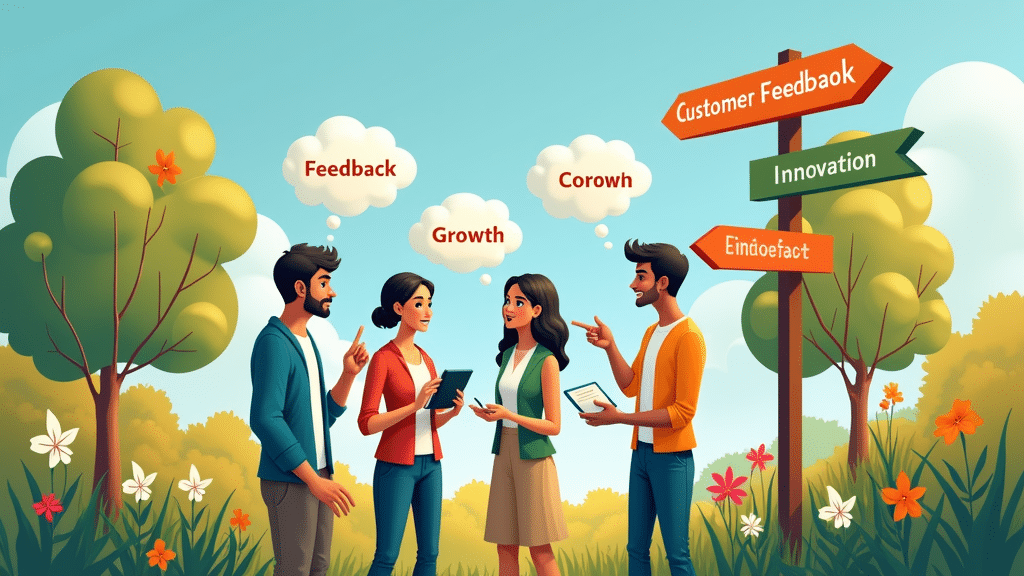Customer feedback is key to improving your outdoor living spaces. It helps you understand what your customers like and what they need. By listening to your customers, you can create better services and products. This information is crucial in making your landscaping and outdoor projects shine.
In Redding, CA, people appreciate beautiful outdoor areas. Feedback can help make those spaces even better.
For more information on improving your outdoor areas, consider exploring some effective landscaping ideas that can enhance your property.

Customer feedback is when people share their thoughts about your services or products. They might talk about what they like or what can be better. This feedback can come from surveys, reviews, or direct conversations. In landscaping, feedback tells you how well your work is meeting clients’ needs.
For example, if a customer loves a new patio you built, that shows you are on the right track. But if someone mentions an issue, like the color of the fence not fitting their style, that gives you a chance to improve.
Customer feedback is important for many reasons. First, it helps you understand your clients better. When you know what they think, you can make informed decisions. This can lead to better designs and services. Second, it helps build trust.
When you listen to what your clients say and make changes, they feel valued. This can turn first-time clients into loyal customers. In a place like Redding, where people love their homes and yards, this loyalty is essential.
| Benefit of Customer Feedback | Description |
|---|---|
| Improved Customer Satisfaction | Tailoring services to meet client preferences increases overall satisfaction. |
| Enhanced Reputation | Positive feedback can enhance your business reputation in the community. |
| Increased Customer Loyalty | Clients are more likely to return if they feel heard and valued. |

Collecting feedback is a simple process. Here are some effective ways to gather input from your clients.
Surveys are quick and easy. You can send them through email after a job is done. Ask straightforward questions about the service. Questions like, “What did you think of our work?” or “How can we improve?” can give you useful insights.
Talking directly with clients can be very effective. When you finish a landscaping project, ask them what they think. This personal touch often leads to deeper insights. People feel more comfortable sharing their honest opinions face-to-face.
Encourage your clients to leave online reviews. Websites like Google and Yelp are great for this. Many people check reviews before hiring services. Positive reviews can attract more customers. They also give you a chance to respond to any concerns.
After finishing a project, send a follow-up email. Ask how they are enjoying their new outdoor space. This not only shows you care but also opens the door for feedback. If they mention something that could be improved, take it into account for future projects.
Use social media to connect with your clients. Platforms like Facebook and Instagram allow you to share pictures of your projects. You can also ask followers for their thoughts and ideas. Engaging with your audience on social media can lead to valuable feedback and new ideas for your business.

Once you have collected feedback, the next step is using it. Here are some ways to make the most of what your clients share.
If clients mention a common issue, it’s time to make changes. For example, if several people say a certain type of plant doesn’t grow well in their yards, consider offering alternatives. Adapting your services based on feedback shows you care about your clients’ needs.
When customers rave about a particular service or design, celebrate that success. You can share their testimonials on your website or social media. This not only boosts your reputation but also encourages others to share their positive experiences.
Use feedback to build relationships with your clients. If someone provides a suggestion, thank them for their input. Let them know you are listening and willing to make improvements. This connection can lead to repeat business and referrals.

Not all feedback will be positive, and that’s okay. Negative feedback can be a chance to grow. Here’s how to handle it.
When you receive negative feedback, stay calm. Listen carefully to what the client is saying. Don’t take it personally. Instead, focus on the issue at hand. This shows you are committed to solving their problem.
Once you understand the issue, respond quickly. Let them know you will work to fix it. Whether it’s a mistake in a project or a service that didn’t meet expectations, addressing the problem shows your dedication.
After resolving an issue, follow up with the client. Ask if they are satisfied with the solution. This follow-up can turn a negative experience into a positive one. It shows you care about their satisfaction.
A customer feedback loop is an ongoing process of gathering input, making changes, and following up. This cycle helps you continuously improve your services. Here’s how to build one.
Make it a habit to collect feedback after each project. This can be through surveys, direct conversations, or follow-up emails. The more feedback you gather, the better you can understand your clients.
Take time to analyze the feedback you receive. Look for common themes or issues. If many clients mention the same thing, it’s wise to take action. This data can guide your business decisions.
| Feedback Analysis Steps | Action to Take |
|---|---|
| Identify Common Themes | Look for recurring issues or praises. |
| Prioritize Changes | Focus on what clients value most. |
| Implement Changes | Make necessary adjustments promptly. |
Once you have analyzed the feedback, decide on changes. This could be adjusting your services, improving communication, or offering new options. Implement these changes quickly to show clients you value their input.
Don’t stop the conversation once you make changes. Keep asking for feedback regularly. This will help you stay in touch with your clients and their needs. It also shows that you are committed to continuous improvement.
Encouraging feedback should be part of your company culture. Here are ways to foster this environment.
Let your clients know that their opinions matter. Make it easy for them to share feedback. You can do this by creating a friendly atmosphere in your interactions. When clients feel comfortable, they are more likely to share honest opinions.
Always thank customers for their feedback. Whether it’s positive or negative, showing gratitude builds goodwill. This simple act makes clients feel valued and more likely to share their thoughts in the future.
Make sure your team understands the importance of feedback. They should know how to ask for it and how to handle it. Giving your staff the tools to gather and respond to feedback can lead to a better overall service.
You can use customer feedback to enhance your marketing efforts. Here’s how.
Use testimonials and success stories in your marketing materials. Share positive feedback on your website and social media. This content can help attract new customers. People love to see real experiences from other clients.
When you make changes based on feedback, share that story. Let potential clients know that you listen and adapt. This transparency builds trust and can help you stand out in Redding’s competitive market.
Consider offering incentives for feedback. You might give a discount for filling out a survey or sharing a review. This can encourage more clients to share their thoughts. It also promotes engagement and loyalty.
You can also explore our privacy policy to understand how we use client information responsibly while gathering feedback.
Customer feedback is a powerful tool for any business, especially in outdoor living and landscaping. It helps you understand your clients and improve your services. By collecting, analyzing, and acting on feedback, you can create a better experience for your customers.
This leads to happier clients and a thriving business in Redding, CA. So, keep the conversation going, listen closely, and watch your outdoor projects flourish.
Remember, feedback is not just about criticism. It’s an opportunity to grow. Embrace it, and your business will continue to thrive in the beautiful landscapes of Redding. By focusing on your customers’ needs, you can create outdoor spaces that everyone will love. Happy landscaping!